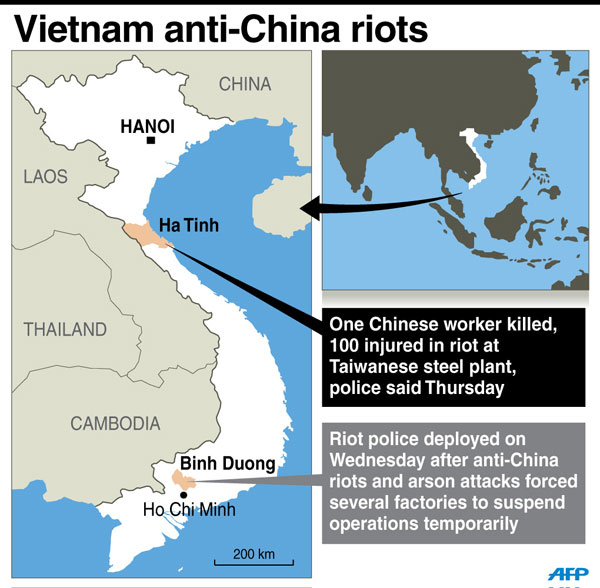1 dead, 100 hurt in anti-China riot in Vietnam
HANOI—A riot at a steel plant in Vietnam has left one Chinese worker dead and over 100 injured, officials said Thursday, as an angry Beijing accused Hanoi of “connivance” in the worst anti-China unrest in decades.
Long-simmering enmity between the communist neighbors has boiled over in Vietnam with protests in major cities and mobs torching foreign-owned factories after China deployed an oil drilling rig in contested waters.
Worker demonstrations have spread to 22 of Vietnam’s 63 provinces, the government said, calling for “tough measures” to bring the situation under control before alarmed foreign investors pull out of the country.
Hundreds of Chinese nationals have fled across the border into neighboring Cambodia, according to police there, amid fears that a wave of patriotic fervor initially encouraged by Hanoi is getting out of hand.
The unrest is “a very disturbing development and has certainly created the impression that in Vietnam (things) were verging out of control,” said Professor Jonathan London at City University of Hong Kong.
Article continues after this advertisement“Additional protests are to be expected and it remains uncertain whether we might observe a repeat of the chaos that’s occurred,” he added.
Article continues after this advertisementVietnam’s communist regime, wary of public gatherings that could threaten its authoritarian rule, has in the past alternated between tolerating anti-China rallies and violently breaking them up.
Experts say Hanoi has allowed some public protests to go ahead recently as a means of expressing extreme discontent with Beijing. The pair have close economic ties but often-fraught diplomatic relations.
The deadly riot broke out Wednesday at a steel mill owned by Taiwanese group Formosa Plastics in Vietnam’s central Ha Tinh province, following earlier violent protests in the south where more than a dozen plants were set ablaze and hundreds of protesters detained.
Workers began “attacking some Chinese workers and damaged offices and equipment,” Formosa said in a statement.
One Chinese worker was killed and at least 149 people were injured, local official Dang Quoc Khanh said.
Beijing lodges protest
China accused Hanoi of acting in concert with the protesters.
The violence in Vietnam had “a direct link with the Vietnamese side’s indulgence and connivance in recent days with some domestic anti-China forces and lawbreakers,” Beijing’s foreign ministry spokeswoman Hua Chunying told reporters.
Later Thursday China lodged “a solemn protest” with Vietnam, the official Xinhua news agency reported.
The Chinese Foreign Minister Wang Yi condemned the violence in an urgent phone call with Vietnam’s Deputy Prime Minister and Minister of Foreign Affairs Pham Binh Minh, it said.
“Wang demanded Vietnam immediately take resolute and effective measures to stop all violence and ensure the safety of the lives and property of all Chinese nationals and companies there,” said Xinhua.
Earlier Xinhua said that around 10 Chinese remained unaccounted for after rioters attacked four Chinese companies in Ha Tinh province, citing a Chinese manager.
Beijing also issued a warning to tourists planning trips to Vietnam, advising them to “carefully consider” their plans.
Arguing over islands
The backdrop is a history of rivalry between China and Vietnam, particularly over the contested Paracel and Spratly islands in the South China Sea.
In 1974, as US troops withdrew from Vietnam, China invaded the Paracel Islands, which were held by the US-backed South Vietnamese regime.
The neighbors fought a brief but bloody border war in 1979 after China invaded following Vietnam’s intervention in Cambodia to oust Beijing’s Khmer Rouge allies.
They came to blows again in 1988 in the contested Spratly islands in a naval battle in which more than 70 Vietnamese sailors were killed.
However, the two countries normalized relations in 1991 and their economies have become increasingly intertwined.
Beijing’s increasing assertiveness in staking its claim to almost all of the South China Sea also has caused concern for other neighboring countries, particularly the Philippines.
Manila released photographs Thursday to support its claim that China was reclaiming land on a disputed reef in the South China Sea in an apparent effort to build an airstrip.
Tensions between China and Vietnam flared earlier this month after Beijing moved a deep-water drilling rig into waters that Hanoi claims.
There have been repeated skirmishes near the controversial oil drilling rig in recent days involving vessels from the two countries, with collisions and the use of water cannon.
Prime Minister Nguyen Tan Dung described the situation as “very serious” and said that, while the recent groundswell of patriotism was “the correct thing,” instigators who broke the law would be punished, according to an official statement.
Export-orientated manufacturing is a key pillar of Vietnam’s economy, with high-profile firms—from electronics giants such as South Korea’s Samsung to US sportswear companies like Nike—producing goods there.
Taiwan is one of the top foreign investors in Vietnam.—Cat Barton
RELATED STORIES
Vietnam shaken by worst anti-China unrest in decades
China issues Vietnam tourist warning after riots
